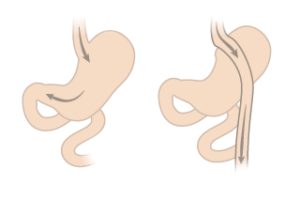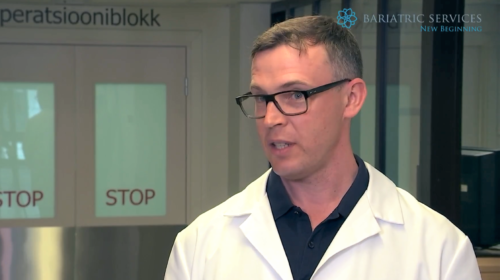Laparoscopic Gastric Bypass surgery is the most popular type of weight loss surgery in the world and the so-called gold standard of weight loss surgeries. The reason for this is good and sustained loss of weight, very good control of accompanying diseases and low risk of surgical complications. The long-term results of the surgery – weight loss, effect on accompanying diseases, low mortality rate – are well documented and reliable.
 There are two components to the procedure. First, a small stomach pouch, approximately one ounce or 30 millilitres in volume, is created by dividing the top of the stomach from the rest of the stomach. Next, the first portion of the small intestine is divided, and the bottom end of the divided small intestine is brought up and connected to the newly created small stomach pouch.
There are two components to the procedure. First, a small stomach pouch, approximately one ounce or 30 millilitres in volume, is created by dividing the top of the stomach from the rest of the stomach. Next, the first portion of the small intestine is divided, and the bottom end of the divided small intestine is brought up and connected to the newly created small stomach pouch.
The procedure is completed by connecting the top portion of the divided small intestine to the small intestine further down so that the stomach acids and digestive enzymes from the bypassed stomach and first portion of small intestine will eventually mix with the food.
The main difference of gastric bypass surgery compared with sleeve gastrectomy is the shortening of the food’s path in the digestive system.
How does gastric bypass surgery work?
First, the newly created small stomach pouch necessitates significantly smaller meals. As a result, patients feel full after eating a small quantity of food, and thus consume less calories.
Secondly, because there is less digestion of food by the smaller stomach pouch and bypassed part of the small bowel, some extent less absorption of calories and nutrients will occur.
Additionally, rerouting of the food stream leads to changes in gut hormones that promote satiety and suppress hunger.
 There are two components to the procedure. First, a small stomach pouch, approximately one ounce or 30 millilitres in volume, is created by dividing the top of the stomach from the rest of the stomach. Next, the first portion of the small intestine is divided, and the bottom end of the divided small intestine is brought up and connected to the newly created small stomach pouch.
There are two components to the procedure. First, a small stomach pouch, approximately one ounce or 30 millilitres in volume, is created by dividing the top of the stomach from the rest of the stomach. Next, the first portion of the small intestine is divided, and the bottom end of the divided small intestine is brought up and connected to the newly created small stomach pouch.
